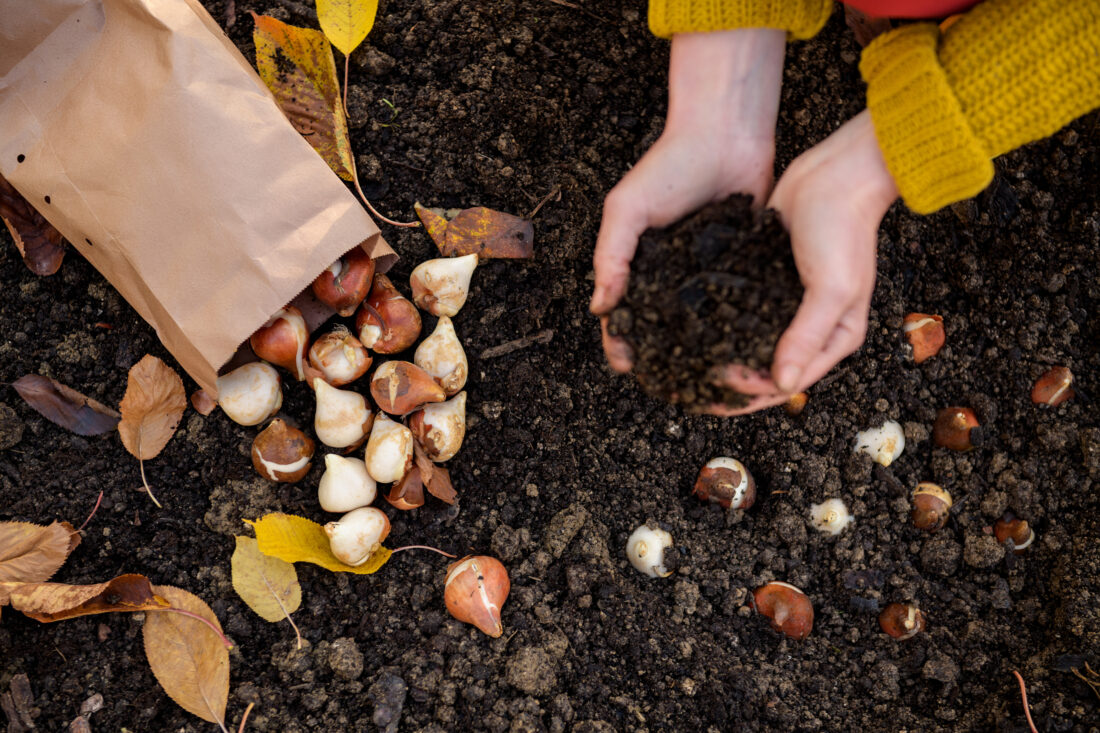September 28, 2023
Planting Bulbs in the Fall for a Vibrant New England Spring
As the leaves begin to change colors and the air turns crisp, it’s time to think ahead to the next gardening season. Fall is the perfect time to start planning for a vibrant spring garden in New England. One of the most satisfying ways to usher in the beauty of spring is by planting bulbs such as daffodils, crocuses, and tulips. In this guide, we’ll take you through the steps to ensure your spring garden is a colorful and deer-resistant masterpiece.
Step 1: Selecting Your Bulbs
Visit us in early fall for a stunning array of bulbs for your garden. This is when you’ll find the widest variety and freshest selection. Look for daffodils, crocuses, tulips and more in various colors and sizes to create a visually stunning display.

Step 2: Preparing the Soil
Before planting, take the time to prepare your soil. Bulbs thrive in well-draining soil that is rich in organic matter. Add compost to your garden bed and work it into the soil to create a loose, nutrient-rich environment for your bulbs. This preparation will make it easier for you to plant and ensure your bulbs receive the nutrients they need.
Step 3: Timing is Crucial
While it’s tempting to start planting bulbs immediately, try to exercise a little patience. Wait until late autumn (after the first frost) when rodents are hibernating and the soil has cooled down a bit. This will help protect your freshly planted bulbs from becoming a tasty snack for underground critters.
Step 4: Planting Your Bulbs
Now, it’s time to get your hands dirty. You can either dig individual holes for each blub or dig a larger hole for a mass planting and thrilling spring show! In general, plant daffodils and tulips at a depth of 6 to 8 inches, while crocuses should be planted at around 3 to 4 inches deep. Watch Luc’s tips below for creating a stunning display using a mass planting technique! You can also check out this awesome infographic on how deep to plant your bulbs here!
View this post on Instagram
Step 5: Fertilize with Espoma Bulb Tone
To give your bulbs a strong start, apply Espoma Bulb Tone when planting. This organic fertilizer is specifically formulated for bulbs and provides essential nutrients to promote healthy growth and vibrant blooms in the spring.

Step 6: Deer and Rabbit Resistance
One of the benefits of planting daffodils is that they are unpalatable to deer and rabbits due to their toxic compounds. To protect your tulips from these garden visitors, consider planting daffodils and tulips together. The presence of daffodils will deter animals from munching on your tulips, ensuring a colorful display come spring. You can also use any number of forms of animal control from fencing to deterrent, take a look here for some options!
Step 7: Extend Your Spring Joy
One of the joys of planting a combination of bulbs like crocuses, daffodils, and tulips is the extended bloom time. Crocuses are often the first to emerge, followed by the cheerful daffodils, and finally, the elegant tulips. This sequential flowering will keep your garden in bloom for several weeks, providing continuous beauty and enjoyment.
Step 8: Protecting Against Rabbits in Early Spring
As the snow melts and spring arrives, hungry rabbits may be on the lookout for tender green shoots emerging from your bulbs. To prevent them from nibbling on your plants, use a rabbit repellent like Rabbit Scram. Applying this product around the garden area in early spring will help deter rabbits and protect your emerging foliage.
Planting bulbs in the fall for a stunning spring display in New England is a rewarding endeavor for any gardener. By selecting the right bulbs, timing your planting correctly, and taking steps to protect against rodents and hungry animals, you can ensure a colorful and vibrant garden come spring. So, get out there, prepare your soil, and start planning your bulb garden now for a spectacular spring season ahead!
For more information and frequently asked questions visit Netherland Bulb Company’s FAQ page.


